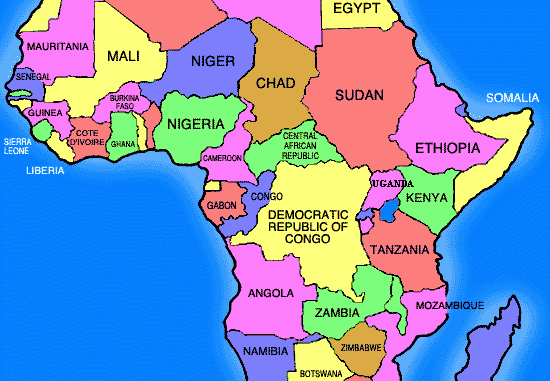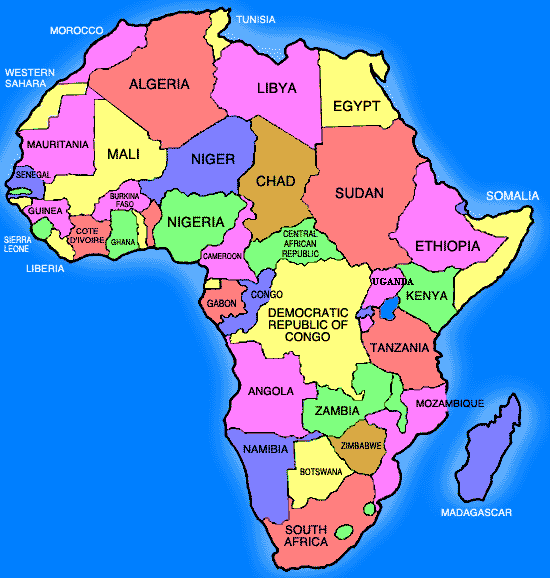
 |
For the greater part of the period passed since the process of African decolonization began[1] voices have been raised in praise of the old order, few of them white European but the absolute majority of them African. It’s tempting to disregard them all as bitter house negroes who have fared worse since the destiny of Africans, on a formal political level at least, rested on the shoulders of Africans. The issues raised by reactionaries are too grave to be whisked aside; the gross domestic product per capita levels[2] have fallen since the seventies in most sub-Saharan states, and the African nations’ part in world industrial production has fallen in relative and absolute figures[3].
By other standards, it’s still impossible to rid oneself of a haunting image of a general African decline. Literacy levels, infant mortality, poverty – none of these areas have witnessed great leaps ahead or even substantial changes in a positive direction; in some countries, with the advent of AIDS and the insufficient political reactions to it, life expectancy has even slumped.
This overall gloomy picture is at least partly punctuated by attempts at African unity, aimed at African independence vis-à-vis the West through greater African interdependence to encourage peaceful coexistence, more ecologically sound transportation and less dependence on cash crop production.
With the emergence of what might enthusiastically be dubbed neo-panafricanism, it’s necessary to recall that a lot of it simply amounts to policy changes brought upon Africa by the world community and brought about by the end of the cold war. With the cessation of hostilities in Ethiopia, Somalia, Namibia etc, Western powers have sought to reduce the expenses for policing Africa whilst still insuring a continued steady supply of neo-colonial revenues. Firstly through reducing military aid to allied states and right wing paramilitary groups (Unita et al.). Secondly through using the UN to prompt African states to carry on with the fire brigade rescuing operations that the US and Europe found themselves caught up with in the days of their most heavy democratic and progressive sounding rhetoric immediately following the collapse of Stalinism. That period already stopped short with the Somalian civil war, and was dead and buried in Rwanda. The result being that the two African giants in particular – Nigeria and South Africa, with Libya jockeying for a third place – all play the part of regional rescuing services.
With the recent debate on debt cancellations and even African recompensation, it’s obvious that there’s a lot at stake and that it’s necessary to read the fine print of Blair and Co.’s humanist rhetoric. Who’s fooling who? One thing is certain, the major industrialised economies are busying themselves for two main reasons. Firstly, Western exploitation of the African continent for the last ten fifteen years has reached such an extreme that the very weak African institutions, the very states ruled by leaders bound and gagged by austerity measures imposed from abroad, that are its prerequisite are crumbling all together.
Late Post Colonial Africa
African loans have become all but uncollectible, being more often than not inherited from corrupt and/or authoritarian regimes backed either by a now non existing Soviet Union or a remnant of an ossified USforeign policy. Come a democratic sweep throughout most of the continent, most regimes are not particularly keen on honouring deals struck with their persecutors of yesterday and political opponents of today. To make matters worse, for the most part of postcolonial history, the lines between foreign aid and loans have been constantly blurred, with the absolute majority of western aid being conditional and tied to government purchases of key national industrial products of the benefactor country in question, thereby severely limiting freedom of manoeuvring for newly independent states.
By the late 70s/early 80s, things were getting so out of hand that IMF stepped in to clean up affairs, insofar as the system of tying new African states to the west was rationalised. It meant the end of the previous prevailing system with a tendency towards overbidding in terms of courting new leaders so as to lull them into long term commitment and handing out licences on handling raw materials, refinement etc, and in it’s place came structural adjustment programs that dictated how investment, industrialisation and privatisation policies should be pursued lest thing turn ugly, turning African and Latin-American economies into western smorgasbords.
In this way, plundering could accelerate, since postcolonial governments’ hands were tied through the various loans once granted to win time to get economies on their feet. In the discussion on miracle economic growth, certain countries always get mentioned, the Asian tigers, the NICs (Newly Industrialised Countries) and in the early nineties lexicon the ABC countries of Latin America (Argentine,Brazil, Chile) and now India and China. But what is seldom mentioned is how repeatedly, the former of these countries enjoyed most favoured nation status as loan takers, for political reasons (creating strong regional buffers against the spread of communism etc). Even more seldom is it mentioned that contrary to popular belief, more often than not, these examples of spectacular economic growth have benefited greatly from the presence of strong, nationalised banks serving the establishing of a combative industry being able to take up completion with western industrial nations, rather than being the result of all out neo liberal programmes.
Back in Africa, foreign investment is beginning to become a complete gamble, and cash returns cannot any longer be expected with regime changes not only in troubled areas such as the democratic republic of Congo but also in formerly exemplary states such as Ivory Coast. When the initiative for corporate scramble for Africa rests on individual multinationals rather than the good ?ol formal slicing and dicing of states 130 years back, investments are a lot less safe. Buying private armies has been proven a risky business, and long term stability is in the interest of all multinationals – if only they could deliver. Enter the G8. What giant corporations cannot achieve, synchronized efforts of the world’s leading industrial states can – if everyone falls in line. The crux of the confusion is, among other things, the different influence the various G8 member states hold within the World Bank have, how big a claim to repayment of loans they have. And least but not last, how big the economic interest they have with regard to Africa receiving, if not a light Marshall plan of economic recovery, then at least enough slack to get up on its two feet to get the wheels spinning again.
A secondary issue is an ideological one. Ever since the Zapatista uprising in Chiapas in Mexico, and especially since the hugely successful protests at the world trade organisation summit in Seattle 1999, international trade relations have come under everything from close scrutiny to heavy criticism to complete rejection from large groups, North, South, East and West. The Blair agenda mesmerizingly comes with an explanation of African (and so called developing countries’) poverty that dodges its colonial roots yet manages to posit Western democracies as the saviours of the day. Or put in another way, African prosperity lies comfortably, with trust in Western capitalism if only the latter gives a helping hand, and African poverty is essentially the product and symptom of mismanagement and neglect from a corrupt elite, which is seen as something separate from and in no way a product of the combination of western colonialism and its legacies, IMF endorsed neo liberal capitalist structural adjustment programs (SAPs) coupled with political, financial and military aid to the most corrupt regimes as long as it’s served Western interests for the past forty something years.
In some dogmatic leftwing circles, it is axiomatic that all US policies amount to devilry. The truth is of course, a lot more complex. The US have always been self-serving in it’s foreign policy, but there are examples of countries that have prospered under the canopy of US imperialism. My point is not a claim that the times have changed and we should all cheer and say hoorah because of Western policy changes. No, in reality not a lot has changed except the technical way to administer plunder.
The New World Order.
The US military capacity is more than twice that of the next two contenders, and a lot of it’s technology is one generation ahead of the rest. Technology wise, the runners up (Israel, Britain) are not only amongst America’s closest allies, they are also heavily dependant on American support to maintain their position in the New World order.
Western leaders are keen to “reset” all African economies insofar that they don’t want debts to inhibit business as usual. Not only that, as we’ve witnessed during the past G8 summit before it was blasted into medial insignificance by islamist London commuters/suicide bombers/terrorists (insert favourite), offering African elites an “economic amnesty” gives exploitative trade relations credibility so that they can be maintained without loss of face in Africa, Europe or elsewhere. Cancellation of debts has been the hobby horse advocated by the pious and picked up by more or less everyone else, from cocainist rock stars in Gucci sunglasses to born again Christian statesmen.
Resurfaced panafricanists have challenged that way of posing the question of African poverty, although somewhat inadequately, by trying to flip the script, and maintaining that cancellation of debt is not enough, economic recompensation for colonialism and slavery is more in place, pretty much inspired by Holocaust recompensation claims. But whereas Israel enjoyed substantial American foreign aid and even more substantial military aid as American client state supreme in the region and internationally, temporarily enriched African governments could not industrialise soundly within the brief time span of one or two mandate periods and remain certain of Western benevolence if that same African industrialisation did not serve Western interests or at least, did not threaten Western profits. In the unlikely event of economic recompensation, African countries would have to pursue policies of greatly increased regional cooperation in order to not find themselves indebted again to European and American economies, well protected by agricultural and industrial trade tariffs.
The “New” Neo-colonialism.
Since African problems are structural, all remedies simply prescribing “add cash and stir” into basically bankrupt and corrupt economies are doomed to fail simply because they do not address the heart of the matter – African dependency. Enter the solution as old as colonialism itself, – “more massa!” most unsurprisingly advocated by those who most strongly identify themselves as most gifted as would be rulers with counselling and support from those countries with which they identify. The most confused, disillusioned and most tragically, self-hating internet scribes offer a bullet-proof solution to the problem of African dependency – more African dependency. There are several roots to this hopeless position, internalised racism, “it was better way back when” conservatism, and a great deal of respect for strong, western institutions and traditions. And a great deal of their reasoning owes a lot to Locke and Hobbes, arguing that only the presence of one, strong centralised authority can bring about order out of chaos. That medicine has been prescribed with varying degrees of success in East Timor, Kosovo, Macedoniaetc, and in all none of these cases have the strong centralised authority consisted primarily of former colonisers (Serbian or Indonesian troops) but rather multiethnic forces that can gain the respect of different ethnic parts of the populace.
From the basically very correct observation “we’re worse off now than we were forty years ago” some very wrong conclusions are drawn. One thing is certain; for professionals, academics, teachers etc, motherland education meant that career opportunities were open all over the British/French/Portuguese colonies, and nothing hindered trade between different colonial territories. In so far as there were absolute advantages in how the administration was organised.
This shows how limited the nation state is as a tool to bring about development in this late modern world – if African communications was more free flowing and African economies more integrated fifty years ago (even if it was primarily so arranged to serve European interests), before the emergence of various artificial nation states then surely today’s African nation states present a dead end for Africans except for those corrupt leaders that owe their positions to those very same state formations. (More on the problems posed by the nation states later, but mainly from a domestic perspective.) Today, like jealous brothers, other former colonies are looked down upon and the father figure of “our” colonizer is preferable for aid and support, since he’s bound to have learned to love us after a few centuries of rape. If it was simply expert knowledge and support that was requested, then Indian, Chinese, Brazilian, Cuban, Korean or Iranian engineering would do just as well as formal Oxbridge or école superieur merits. But since most of these sycophants back their claim to relevance with free quotations from their Oxbridge education, it should come as no surprise that they passionately prefer the expertise of their former colonial masters that they somehow share than some other patois speaking natives’ homemade skills.
Most of these sycophants claim to, if not fame then infamy, stems from their own Oxbridge grooming, and they invariably refer to those same institutions for salvation. Great Britain has declined ridiculously as an industrialised nation in the past half century, only picking up the last ten years when it’s come into step somewhat with the rest of Europe, and it took some bribing in the form of special tax exemptions to coax them into going for European cooperation. How do they compare with aforementioned states in terms of development? Very differently in varying cases. But the point is, it’s a completely different thing to claim that “we were better off in the forties” and to say “we’d be better of if we’d be recolonised”. The latter statement misses the fact that one reason Great Britain and it’s brother colonial states have fared so well as they have is that with neo-colonialism, they’ve shoved the burden of administration on to corrupt local elites whilst still, through trade relations, been able to reap the profits inherent in the relations that stem from African underdevelopment.
The profits of African underdevelopment are twofold. First of all, or rather, on a simple level, it’s a question of value, the transformation of value when say bauxite is refined to aluminium. The whole profit lies in that refinement, mining for bauxite is itself as profitable as peanut vending[4]. Secondly, beside all the IMF and World Bank encouragement to focus on few cash crops and raw materials leaving African countries extremely vulnerable to the world market prices and it’s whims, there’s a self-interest for Western states to keep African and so called third world states on a certain level of underdevelopment as to protect their own industry and agriculture (i.e. European Union trade tariffs, stemming from an economic union that preaches the lofty values of death to protectionism and free trade to impoverished nations as a means to access their markets).
Tribalism, Clientalism, Corruption and Democracy
In all African states, two competing systems of power-sharing coexist, and unfortunately, they mix very badly. Traditional tribal clientalist leaders are pitted against each other within the framework of parliamentary democracy. Urban areas are somewhat more resilient to tribalistic politics due to more mixed populations and class based political formations. Under colonialism, tribal divisions were encouraged in the age-old “divide and conquer” way. When the European powers withdrew, and western-trained elites sought to establish parliamentary democracy it accentuated those divisions even more. Whereas tribal chiefs, princes and kings ruled over areas corresponding to those inhabited by “their” tribe, colonialism constructed hybrid multiethnic states where leaders of various tribes disguised as political parties would contest for power over areas much larger than those of their tribes.
Parliamentarianism gave states that were ruled by leaders that, more often than not, were seen as the candidates of one tribe rather than of all people. Multi-ethnicity is nothing bad in itself of course, but in a situation where the mismanagement of colonies led to famine, starvation and epidemics, national elections put pressure on the electorate to vote along ethnic lines and thus, for majority peoples, secure a disproportionate amount of the state’s booty. This would then be redistributed in accordance with old, clientalist traditions. In times of crisis, best to collectively “go for self”. Such arrangements of power- sharing encourage secessions such the Katanga province in the Congolese civil war, the Biafra war etc.
With a framework of more confederate constitutions and greater regional co-operation, a lot of the incitements towards tribalism and secession would be countered. Additionally, with ambitious industrial and development policies, a far greater part of the national wealth would not stem from raw materials, oil or agricultural products which are all local and therefore closely tied to a specific tribe[5]. If the state is seen as an agent that refines what local inhabitants have, and develops the whole nation with the proceeds, good. If it is seen as an agent of multinational companies, handing out contracts to plunder in exchange for small bribes, then to hell with it.
For the average (previously self-governing) villagers in agrarian areas, the arrival of urban ballot informers telling them who is eligible in the national election is bound to muster as much enthusiasm as somebody asking for their support of a team they don’t know in a sport with rules they’re completely unfamiliar with, especially if the office in question entitles the holder to tax levying, looting and oppression. National elections amount to a procedure geared to giving some formerly exiled intellectual of a different tribe the mandate to bully you, just because 51 percent of the population of an administrative area drawn up inBerlin 1884 endorses it. That’s bound to provoke, to say the least. If people do not see themselves as “one” people, what is formally majority rule will be experienced by many as oppression. If on top of this, some political parties advocate religious law, that experience will be unbearable. If 51 percent Hausa-Fulani (or rather, their representatives) want to impose Sharia law on 49 percent Igbos and Yorubas, 100 percent of Igbos and Yorubas will identify themselves not primarily as Nigerian but as Igbo and Yoruba. (In a “us or them” situation, few will risk tossing a vote away by voting for some secular idealist. This is no African phenomenon; check Northern Ireland or former Yugoslavia for example).
An old objection to Western democracy is that the borders of African states do not correspond to fairly homogenous populations but are thoroughly artificial constructs in the first place. Though this objection is accurate, the question is, then what? Trying to return to a pre-colonial Africa in post-modern days seems a bit naive if not impossible. How do we go about giving power to the people? And by the way, how do we go about making Africans of various tribes identify themselves primarily as Africans and/or nationals? How do we make governments accountable, and even more desirable, create more real self-government? A lot of corrupt dictators have used the above objection as a pretext for stripping their citizens, of other tribes and their own, of their civil rights. It’s not democracy that’s flawed, it’s the artificial African nation states that are insufficient as a means to realising African democracy. The necessary steps forward requires reconstituting democracy on a smaller level (locally) in order to make it genuinely popular and on a larger level (regionally) in order to make African societies strong enough to collectively combat western exploitation.
© Nathan Hamelberg 2005




Leave a Reply